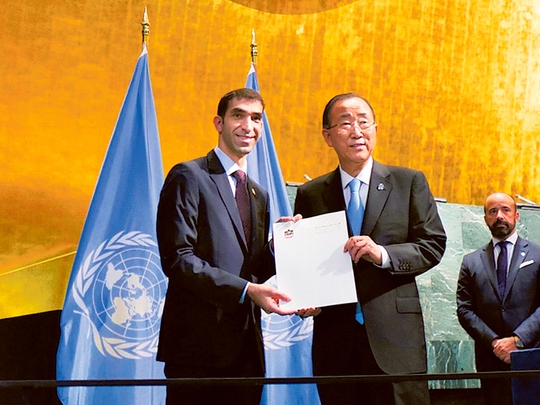
Dubai: The UAE on Wednesday formally ratified the Paris Climate Agreement after the Cabinet’s approval on September 4.
Dr Thani Ahmad Al Zeyoudi, Minister of Climate Change and Environment, submitted the UAE’s documents ratifying the country’s entry into the Paris Agreement to the United Nations during a meeting convened on Wednesday by the UN Secretary General in New York.
“The Paris Agreement is the world’s first truly durable response to climate change. It allows each country to contribute climate actions in accordance with their own economic and development priorities. For the UAE, this means solutions which create new social and economic opportunities and support our ambitious agenda towards economic diversification,” Dr Al Zeyoudi said.
Dr Al Zeyoudi also held meetings with Patricia Espinosa, the Executive Secretary of UN Framework Convention on Climate Change (UNFCCC), and Hakima Al Haite, Minister of Environment and Morocco’s High-Level Champion. Dr Al Zeyoudi reiterated the UAE’s support to the UNFCCC process and to ensuring successful outcomes at the upcoming Marrakech Climate Change Conference, which will be held in November.
The Ministry of Climate Change and Environment in June began developing the UAE National Climate Change Plan, which will set a national framework for climate action. The Climate Change Plan is being designed in consultation with the government, business stakeholders, academia and civil society organisations and will prove that climate action can go hand in hand with increased economic growth and development.
Playing its part to tackle climate change, the UAE has come up with policies and initiatives that aim to diversify the economy into new, knowledge-based industries.
The UAE has led the region in deploying clean energy, with pioneering projects and policies in renewable and nuclear energy, energy and water efficiency, and carbon sequestration and was the first in the region to set a clean energy target of 24 per cent by 2021. It has also deployed energy-saving infrastructure — from strict green build codes to world-class light rail and metro systems.
In an unprecedented show of political will, more than 175 countries signed the agreement in April 2016. So far, 60 countries, representing just 48 per cent of global greenhouse gas emissions, have ratified the agreement. To enter into force, it must be ratified by at least 55 countries representing at least 55 per cent of global greenhouse gas emissions.
Commenting on the UAE’s ratification, Ida Tillisch, director general of the Emirates Wildlife Society-WWF, said: “We welcome the leadership shown by the UAE government in ratifying the Paris Agreement yesterday in New York. The UAE is the first country in the Middle East to take this step. We hope this inspires other countries in the region to follow suit as every effort must be made to ensure the Paris Agreement comes into force as soon as possible. While certain consequences of climate change are now irreversible, they are not unstoppable. Urgent and accelerated implementation of the Paris climate deal is necessary in order to prevent the worst impacts of climate change globally and locally.”
Tanzeed Alam, climate and energy director, Emirates Wildlife Society in association with WWF (EWS-WWF), stated: “This is an important milestone but it is just the start and we need to see all countries ramping up their level of ambition urgently because the current level of pledges are insufficient to limit warming to 1.5 degree Celsius as required by the Paris agreement.”
Alam continued: “Unabated climate change will result in substantial impacts on our food, energy and water supplies. We want to see a strong ‘UAE National Climate Change Plan’ which includes ambitious targets to reduce greenhouse gas emissions as well as measures to adapt to these impacts. In other words, the UAE’s global commitments need to be translated into local actions such as more renewable energy on the ground, energy-efficient buildings across the UAE and fuel-efficient vehicles widely available.”
Alam further added: “We believe that the implementation of ambitious measures in the UAE to comply with the Paris agreement will create new economic sectors, drive innovation and job creation, while diversifying the economy away from oil, all in alignment with UAE Vision 2021.”












